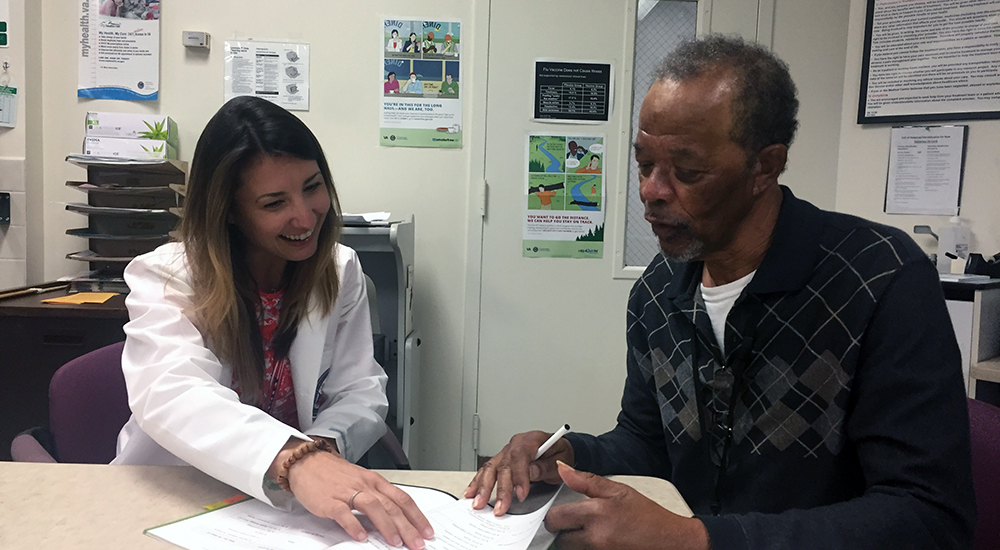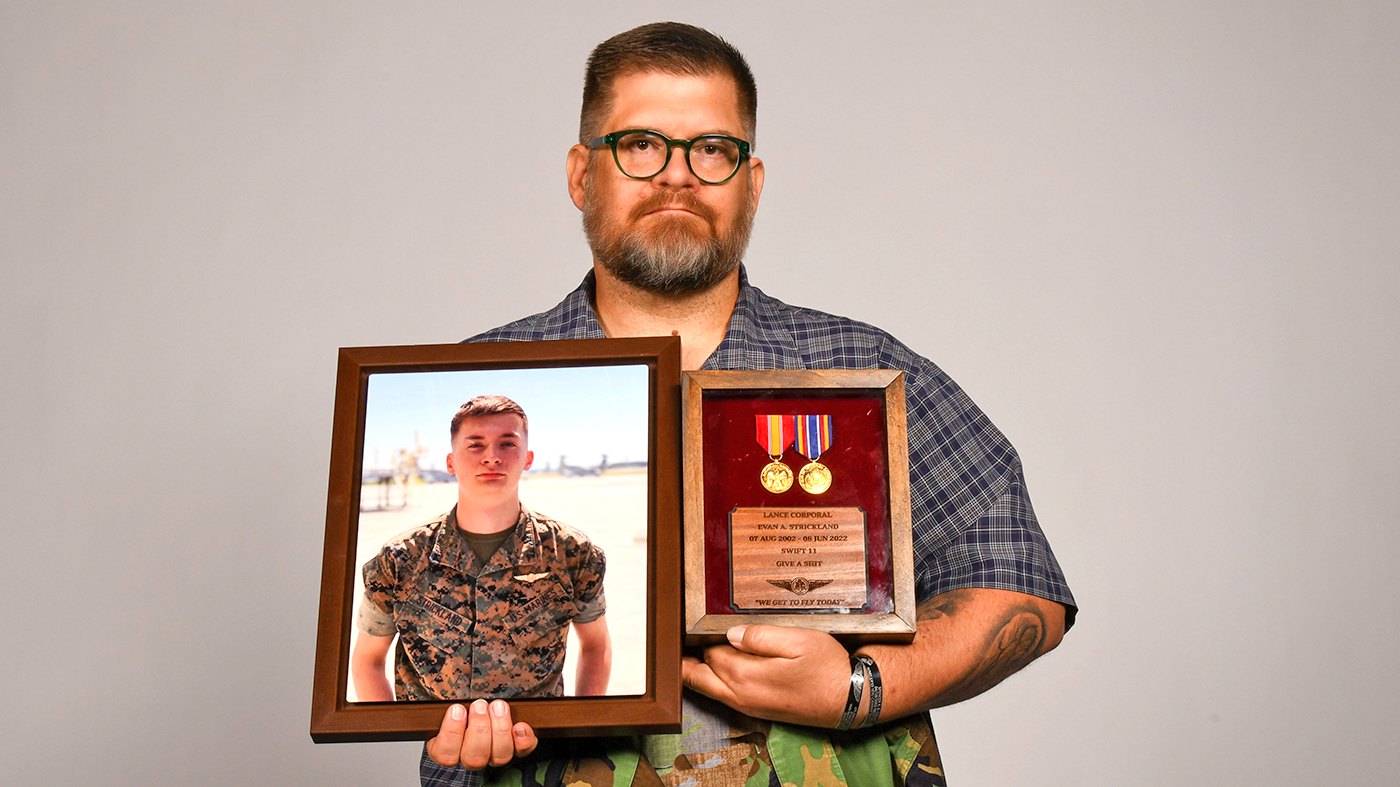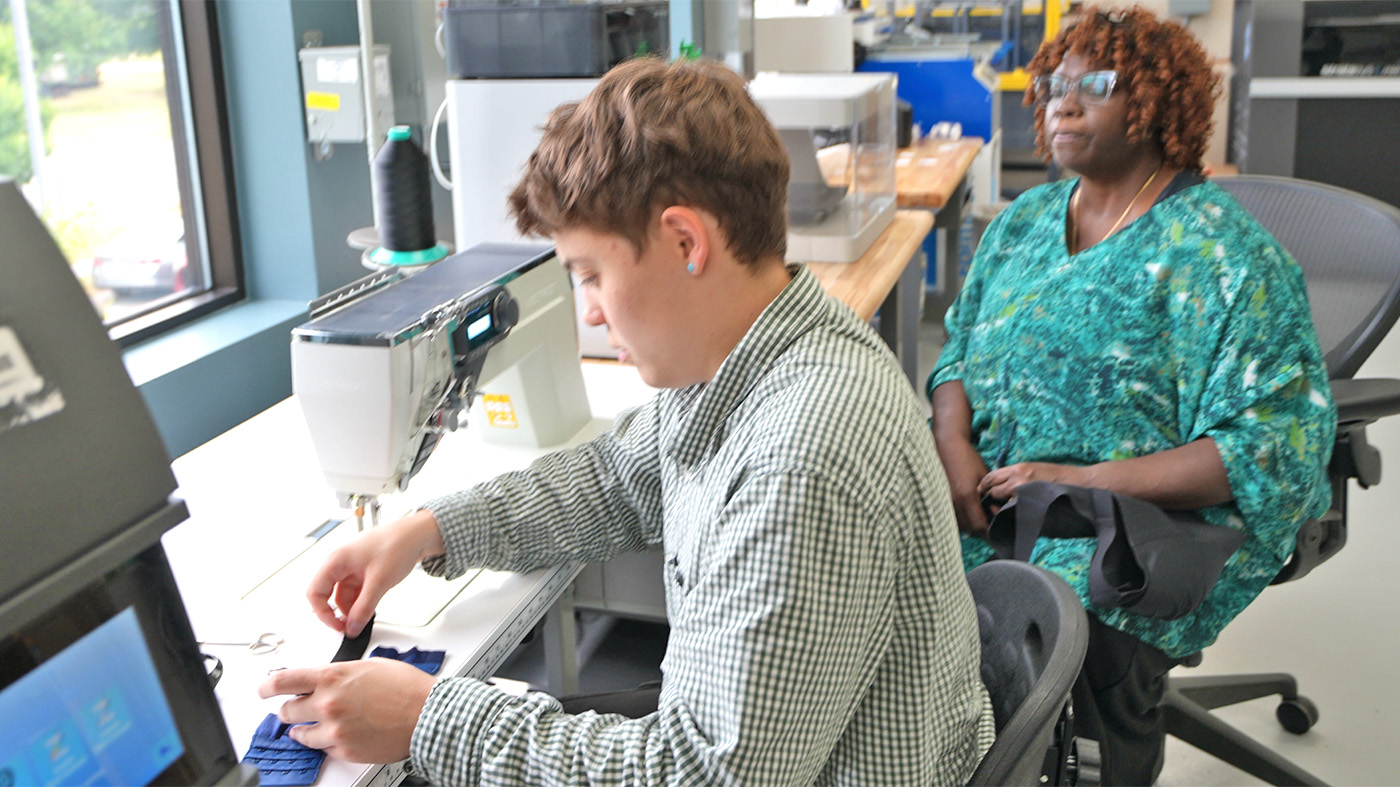Dr. Candis Cornell (top left) discusses tobacco cessation strategies with Air Force Veteran Johnie Chattman (top right) in preparation for their next tobacco cessation session. (Photo by Melanie Thomas).
“We are soldiers and we all need to be aware of the enemy behind the lines,” said U.S. Air Force Veteran Johnie Chattman. “For me, cigarettes were the enemy. I had to deal with it myself to win the battle I was fighting.”
“Knowing the enemy behind the lines…”
Like Chattman, many Veterans are making the choice to become tobacco free. Choosing to quit can be a tough personal decision. The physical stress from withdrawal and alteration of daily habits can make it challenging.
The good news is that Veterans do not have to do it alone. The Bay Pines VA Healthcare System offers Veterans, family members and employees several resources that can help them along their journey.
“Research has demonstrated that people find the most success in quitting tobacco when they use a combination of tobacco cessation medication approved by the Food and Drug Administration (FDA) in addition to tobacco cessation counseling,” said Dr. Candis Cornell, clinical psychologist and health behavior coordinator, Bay Pines VAHCS.
Tobacco treatment coaches at Bay Pines offer the highest level of support, education and behavioral strategies to aid Veterans in their journey to becoming tobacco free.
U.S. Air Force Veteran Eric Allen used the program to quit tobacco almost eight years ago, “I quit thanks to the program that was available to me. I had tortured myself for decades. When I came to Bay Pines I was scared. My doctor had just sent me for a CAT scan and explained that the pericardial effusion I was diagnosed with was due to my smoking habit,” he said.

Air Force Veteran Eric Allen listens to his comrades and provides valuable peer support during a tobacco cessation session.
The Tobacco Free program meets once a week for one-hour sessions. The classes are designed to address different topics each week. Topics include overcoming triggers, altering habits and managing stress. The class also provides the necessary tools and skills to help Veterans achieve success, monitor their tobacco use and encourage setting a quit date within the first few weeks of attendance.
Motivational interviewing strategies are used by tobacco treatment facilitators during group and individual counseling sessions. These strategies play an instrumental role in helping Veterans quit for good.
“For the most part, Veterans already have the answers they need to help them overcome their addition to tobacco. Motivational interviewing strategies help them uncover those answers,” said Cornell.
“I smoked for over 50 years. I’ve tried to quit smoking before, but this time I decided to quit, quitting,” said Chattman. When I came to Bay Pines, I couldn’t talk. This was a big deal to me. I used to sing in my church choir and couldn’t participate anymore because of tobacco,” he continued.
The American Cancer Society suggests that it takes an average of 8 – 10 quit attempts before tobacco cessation sticks.
“I’ve learned to tell myself certain truths and reward myself after winning a battle with a craving. One of those rewards is being able to enjoy the time I have with my grandkids,” explained Chattman.
In addition to FDA approved tobacco cessation medication and counseling sessions, the VA has developed useful tools to engage Veterans who are trying to quit.
Quit VET is a great way to connect with a tobacco cessation counselor. The goal of the national hotline (1-855-QUIT-VET) is to provide Veterans with the resources to develop a quit plan and discuss strategies for staying on track.
Another innovative resource available to Veterans is SmokefreeVet. SmokefreeVet is a text messaging program available in both English and Spanish that provides daily tips and encouragement to support Veterans while they stop using tobacco. After texting VET to 47848, Veterans receive two to five encouraging messages each day. The messages help to provide support two weeks before users’ quit dates and continues for six weeks following their quit date.
The Stay Quit Coach App resource has been specifically designed to address the needs of Veterans with PTSD. The app guides users in creating a tailored plan that accounts for their personal reasons for quitting and has interactive tools to help Veterans cope with urges to smoke.
The most valuable resource available to Veterans is their health care team. Talking with health care providers can help individuals customize a strategy that works best for them.
To learn more about the Bay Pines VAHCS Tobacco Free program, please visit: https://www.baypines.va.gov/BAYPINES/services/Tobacco_Cessation.asp. The webpage includes valuable information and tobacco cessation resources as well as information about Bay Pines VAHCS’s tobacco free policy.

Topics in this story
More Stories
From holiday feasts to everyday dishes, discover how cranberries can add flavor, color and a nutritional punch for this week's #LiveWholeHealth practice.
Gold Star father and VA employee reflects on the life and dreams of his son, Lance Corporal Evan Strickland.
The Office of Advanced Manufacturing at Richmond VA helps an Army Veteran regain independence with a one-handed bra closure.







Great story!!!